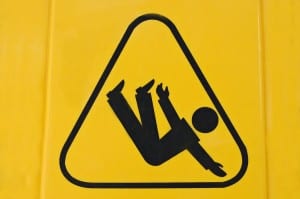Steps to Take in Slip & Fall Accident
Slip and fall accidents are often trivialized and even ridiculed. However, these types of accidents can cause very serious personal injuries and even wrongful death. If you or a loved one is injured in a slip and fall accident, there are a number of very important steps that you should take to protect your claims.
Be Diligent in Documenting Exactly How the Injury Occurred

But understand that your claims for injuries at a friend’s home or even more so at a family member‘s may be viewed with suspicion and skepticism by the insurance company. Therefore, complete and clear documentation of your injury and how it was sustained is an absolute must.
Identify Witnesses
This relates to the first. However, in cases of serious injury, the last thing on one‘s mind at the time is getting witness statements. In fact, this may not be possible at all as the injured person may be transported from the home by ambulance.
In these cases, or in cases of wrongful death, there may be law enforcement or medial personnel that gather information. But these investigations may not identify all witnesses for a number or reasons. As such, as soon as possible and to the degree possible, a list of all possible witnesses and their contact information should be made.
Identify Insurance Coverage
Determine whether the property is covered by homeowner‘s insurance. Finding out right away whether there is homeowner‘s insurance can alleviate some of the stress of worrying about how a friend or relative will be able to afford to pay your medical expenses, and if they cannot pay, how you are going to pay them.
Keep in mind that you are making claim against the insurance company. In most cases, the insurance will be sufficient to cover all damages. If it does not, then some difficult and much more unpleasant decisions will need to be made regarding the suit of a friend or family member.
Identify the Property Owner or Property Manager
If you need to file a lawsuit, it is important to sue the proper party. It is also necessary to name all the possible parties.
For instance, though you are seeking compensation under the homeowner‘s insurance policy you do not name the insurer. The lawsuit must be brought against the property owner and/or the property manager.
Understandably, this can be difficult when the property owner is a friend or relative. Keep in mind that if all the parties understand that this is not a personal matter but is a legal necessity in order to access the insurance coverage.
Notify the Insurance Company and/or Property Owner of Possible Claims
Some insurance policies set forth specific time frames in which they must be notified of a potential claim. These are typically binding only on the insured, not the injured party. However, there are cases where the party must be notified fairly quickly as in claims against the government.
On the other hand, it may be wise to notify both the property owner/tenant/manger//lessee… and the insurance of the claim for evidentiary reasons. In other words, you put them on notice that there was an accident and that any evidence of the accident must be preserved. This relates to possible spoliation of evidence which will not be covered here.
Identify Possible Third Parties
There are cases where there are third parties that share in liability for a slip and fall accident. This could arise in any number of situations.
Most common would be a case where contractors such as vendors, landscapers, remodelers and so forth have caused dangerous conditions on the property. The homeowner may still have liability but these parties may share in the responsibility where an unreasonably dangerous condition has been created.
Due to comparative negligence issues, the injured person‘s claims may be significantly reduced or even precluded if the dangerous conditions were both obvious and avoidable.
Document All Damages
Keep thorough and accurate records of all injury related damages. This should include an accurate accounting of all medical expenses, lost wages, and any other expenses incurred as a direct result of your injury. This is something that an experienced personal injury attorney will able to assist you with.
Free free to contact us at Collins & Collins, P.C. for a free review of your case.

